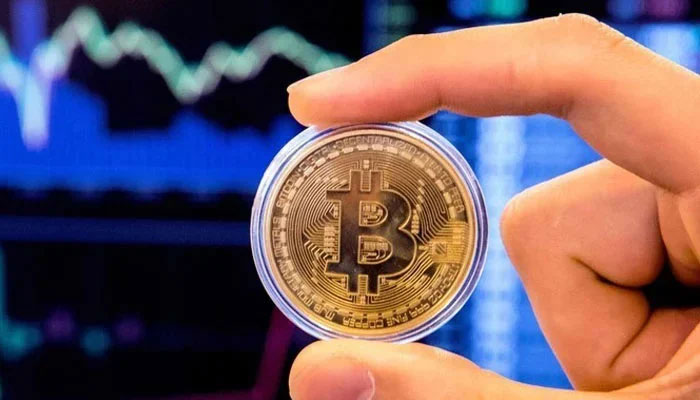Pakistan faces crypto dilemma
KARACHI: As Pakistan fails to come up with coherent policies regarding cryptocurrencies, dozens of traders miss out on building a thriving trading career in digital assets.
Dubai-based cryptocurrency trader Muzammil Shaikh Bismil tells The News that “cryptocurrencies have been here for the last 15 years. This industry is continuously making progress and proving to be a new asset class. The Security Exchange Commission of the US recently approved the first US-listed exchange-traded funds (ETF) to track Bitcoin. This move has given the industry exposure that is no less than remarkable.”
He adds that several countries, including India, regularized this industry several years ago. “India, for example, charges a 30 per cent tax on crypto gains, similar to the tax charged on capital gains on shares.” Work in Pakistan, however, has been slow in this regard.
Web3 and digital asset consultant Arsalan Khan says that cryptocurrencies are now a $2.5 trillion market. With some unofficial numbers suggesting that Pakistan has over 20 million registered accounts with different exchanges, Khan says that “this is almost equal to the number of bank accounts in the country. So the scope for digital assets is definitely there, and with the Pakistani rupee devaluing, crypto will remain an alternate store of value.”
According to Bismil, Pakistani policies have driven away “thousands of crypto traders” who have migrated to countries like the UAE, Turkey and the US, “all of which provide a legal framework and a safe work environment for this industry.” He also thinks that by not recognizing this digital asset, Pakistan is missing out on much-needed tax revenue “because this industry is entirely non-taxable in Pakistan.”
But cryptocurrencies have had their fair share of scandals. In 2023, Binance, the world’s largest crypto exchange, was fined $4.3 billion by the US government for its involvement in money laundering. In 2022, the world’s second-largest crypto exchange, ‘FTX’ crashed. These factors make the market more volatile, raising scepticism among market experts.
Chief Executive Officer of Invents Global Amar Makhdoom highlights the risks involved. According to him, “cryptocurrencies like Bitcoin pose risks to Pakistan’s financial stability due to their volatile nature and lack of regulation. Platforms like Binance, if not carefully monitored, could facilitate money laundering and capital flight, harming the country’s financial system.”
He adds that “a lot of Pakistani tech companies invested in crypto, but now that the retention is 50 per cent, they are bringing cash back into our system.”
What should Pakistan do then? Per Arsalan Khan, “As for Pakistan, we need to regulate the on-ramp and off-ramp sides of crypto first. Peer-to-peer transactions need to be licenced. Exchange companies are supportive enough to share data with governments.
We should allow the conversion of fiat into crypto via our banking channels. We need to understand that it is nothing but data, and monetizing that data for the country is the second step. So far, our government has skipped the first step and is only looking to tax, which, in my opinion, will again create parallel economies.”
-
 Jonathan Majors Set To Make Explosive Comeback To Acting After 2023 Conviction
Jonathan Majors Set To Make Explosive Comeback To Acting After 2023 Conviction -
 Next James Bond: Why Jacob Elordi May Never Get 007 Role?
Next James Bond: Why Jacob Elordi May Never Get 007 Role? -
 Maddox Drops Pitt From Surname In Credits Of Angelina Jolie’s New Film 'Couture' Despite Truce From Father's End In Legal Battle
Maddox Drops Pitt From Surname In Credits Of Angelina Jolie’s New Film 'Couture' Despite Truce From Father's End In Legal Battle -
 Burger King Launches AI Chatbot To Track Employee Politeness
Burger King Launches AI Chatbot To Track Employee Politeness -
 Andrew’s Woes Amid King Charles’ Cancer Battle Triggers Harry Into Action For ‘stiff Upper Lip’ Type Dad
Andrew’s Woes Amid King Charles’ Cancer Battle Triggers Harry Into Action For ‘stiff Upper Lip’ Type Dad -
 Experts Warn Andrew’s Legal Troubles In UK Could Be Far From Over
Experts Warn Andrew’s Legal Troubles In UK Could Be Far From Over -
 Teyana Taylor Reflects On Dreams Turning Into Reality Amid Major Score
Teyana Taylor Reflects On Dreams Turning Into Reality Amid Major Score -
 Jennifer Garner Drops Parenting Truth Bomb On Teens With Kylie Kelce: 'They're Amazing'
Jennifer Garner Drops Parenting Truth Bomb On Teens With Kylie Kelce: 'They're Amazing' -
 AI Is Creating More Security Problems Than It Solves, Report Warns
AI Is Creating More Security Problems Than It Solves, Report Warns -
 'Game Of Thrones' Prequel 'A Knight Of The Seven Kingdoms' New Ratings Mark Huge Milestone
'Game Of Thrones' Prequel 'A Knight Of The Seven Kingdoms' New Ratings Mark Huge Milestone -
 Apple Seeks To Dismiss Fraud Suit Over Siri AI, Epic Injunction
Apple Seeks To Dismiss Fraud Suit Over Siri AI, Epic Injunction -
 Delroy Lindo Explains The Crucial Role Of Musical Arts In Setting Up His Career Trajectory
Delroy Lindo Explains The Crucial Role Of Musical Arts In Setting Up His Career Trajectory -
 Timothée Chalamet Reveals How He Manages To Choose The Best Roles For Himself
Timothée Chalamet Reveals How He Manages To Choose The Best Roles For Himself -
 Princesses Beatrice, Eugenie’s Conflict Gets Exposed As Mom Fergie Takes Over The Media
Princesses Beatrice, Eugenie’s Conflict Gets Exposed As Mom Fergie Takes Over The Media -
 Kate Middleton Plays Rock-paper-scissors In The Rain
Kate Middleton Plays Rock-paper-scissors In The Rain -
 Lindsay Lohan On 'confusing' Teen Fame After 'Mean Girls': 'I Should Have Listened To My Mom And Dad'
Lindsay Lohan On 'confusing' Teen Fame After 'Mean Girls': 'I Should Have Listened To My Mom And Dad'




